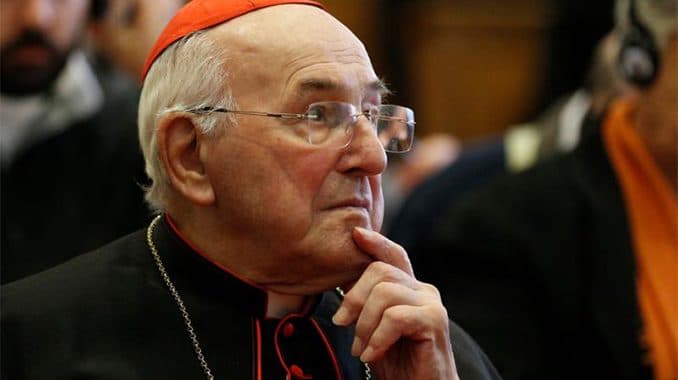ROME – German Cardinal Walter Brandmüller, a once influential conservative prelate known to be at odds with several aspects of the Francis papacy, has asked that the right to vote in a conclave be limited to those residing in Rome.
Brandmüller said that there are too many cardinals who come from faraway places, so they lack experience with the Roman Curia and do not know one another, making them vulnerable to lobbies attempting to push a specific candidate forward.
In a speech given during this week’s meeting of cardinals, Brandmüller said that in his view, a “serious reflection should be given to the idea of limiting the right to vote in conclave, for example, to cardinals residing in Rome, while the others, still cardinals, could share the ‘status’ of cardinals over eighty,” who are ineligible to cast a vote.
It is therefore “desirable,” he said, “that the office and competence of the college of cardinals be updated.”
Brandmüller, 93, was one of some 197 cardinals who gathered in Rome this week for an Aug. 29-30 meeting of the world’s cardinals to discuss Pope Francis’s recent reform of the Curia. The meeting took place after an Aug. 27 consistory, in which 20 new cardinals received red hats.
President emeritus of the Pontifical Committee for Historical Sciences, Brandmüller is also considered a leading critic of the Pope Francis pontificate and was among the four authors, who in 2016 submitted dubia on Francis’s post-synodal apostolic exhortation, Amoris Laetitia. Only two of the authors, Brandmüller and American Cardinal Raymond Burke, are still living.
In his remarks, published on the Settimo Cielo blog of veteran Italian journalist Sandro Magister, Brandmüller noted that the last meeting of the world’s cardinals took place in 2014, shortly after the election of Francis.
Meeting after such a long stretch, he said, “prompts a reflection on the nature and task of the cardinalate, especially in the current circumstances.”
Brandmüller noted that the role of a cardinal is not just to elect a new pope, but also, regardless of their age, to advise him either individually or as a group on “questions of major importance” in the life of the church.
The main method for assisting the pope, he said, quoting Canon Law, is through the convocation of consistories.
To this end, Brandmüller pointed to the ancient rite of the aperitio oris, meaning the “opening of the mouth,” which implied “the duty of frankly expressing one’s own conviction, one’s advice, especially in consistory.”
This frankness, often called parresía by Pope Francis, is now being replaced “by a strange silence,” he said.
“Today, however, there is a need to emphasize the right and indeed the duty of cardinals to express themselves clearly and with frankness precisely when it comes to the truths of faith and morals, of the bonum commune of the church,” he said.
He noted that in recent consistories forms had been distributed requesting a time to speak, and room was also given for spontaneous contributions on a given topic.
Calling this a “a completely useless procedure,” Brandmüller said a suggestion that was given to the dean of the College of Cardinals to convey a discussion topic in advance so that remarks could be prepared beforehand “went unanswered,” meaning that for the past eight years, “the consistories have ended without any form of dialogue.”
“The primacy of the successor of Peter, however, in no way excludes a fraternal dialogue with the cardinals, who are obliged to cooperate assiduously with the Roman Pontiff,” he said. “The more serious and urgent the problems of pastoral governance, the more necessary is the involvement of the college of cardinals.”
Brandmüller noted that Pope Celestine V – whose tomb Pope Francis visited during his visit to L’Aquila on Sunday and who in 1294 was the last pope to resign before Benedict XVI – stepped down only after “intense” consultation with the cardinals who elected him.
He noted that Pope Paul VI increased the number of cardinal-electors, meaning those under 80, to 120, whereas it was previously capped at just 70.
This decision nearly doubled the number of cardinal electors, Brandmüller said, voicing his belief that the decision was largely motivated “by the intention of accommodating the hierarchy of countries far from Rome and honoring those churches with the Roman purple.”
“The inevitable consequence was that cardinals were created who had no experience of the Roman Curia and therefore of the problems of the pastoral governance of the Universal Church,” he said, saying all this has had “serious consequences when these cardinals of the peripheries are called to elect a new pope.”
Noting that many of the new cardinals appointed in the past eight years do not know one another, Brandmüller said they are still expected to elect a new pope from among themselves.
“It is clear that this situation facilitates the operations of groups or classes of cardinals to favor one of their candidates. In this situation the danger of simony in its various forms cannot be excluded,” he said.
One of the main conservative theories of the conclave that elected Pope Francis was that his election was the result of specific campaigning by the so-called “St. Gallen Group” of left-leaning cardinals who reportedly attempted to block the election of Benedict XVI in 2005, and who allegedly adopted Francis as their candidate in 2013.
“In short,” Brandmüller said, “it seems desirable that the office and competence of the college of cardinals be updated.”
Follow Elise Ann Allen on Twitter: @eliseannallen











